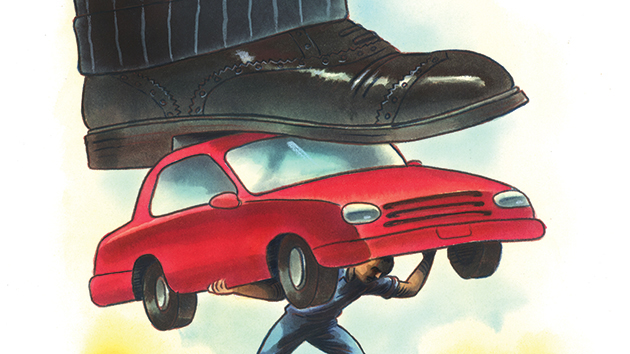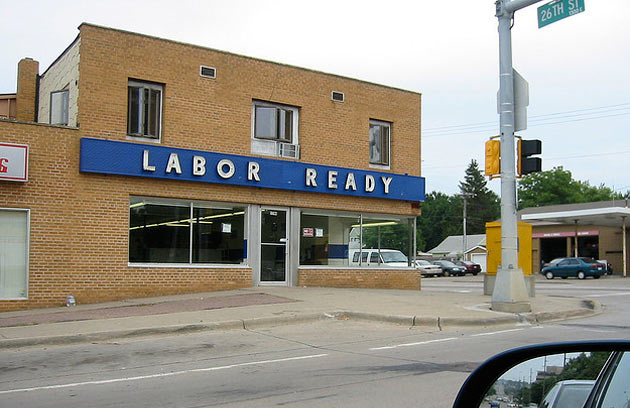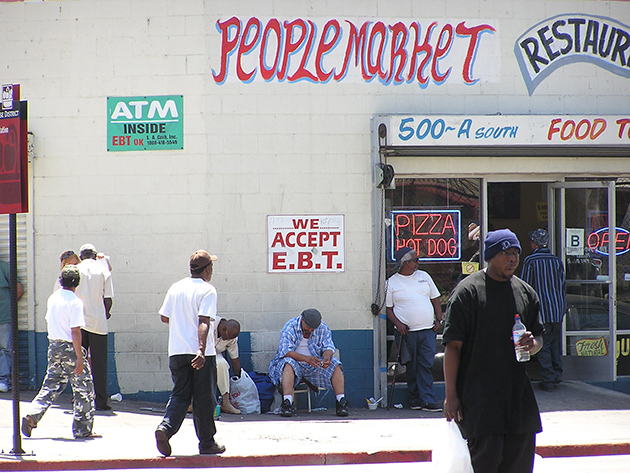
As a graduate student in sociology at the University of California-Los Angeles, Forrest Stuart embarked on a stint of what one might call immersive urban ethnography. Now an assistant professor at the University of Chicago, he was interested in how America’s most desperate people—homeless, addicts, parolees—went about trying to start over. “I had worked with prisoner advocacy groups and in minimum-security prisons,” he told Mother Jones. “I’d meet guys who would be released at 5 a.m. with no food, no nothing. If I were one of those guys, maybe just a guy who needed food, or an addict who hadn’t had any treatment in prison, I would do whatever I had to do to survive—and maybe that would mean something illegal.”
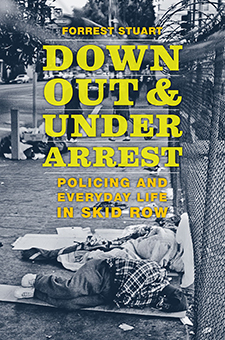
Forrest had heard that the 50-block section of Los Angeles known as Skid Row was among the most impoverished and heavily policed locations in America—the “ground zero,” as he puts it, of the bootstrap story—so he went there. “I started by sitting in the courtyards, standing on the corners, hoping that people would strike up conversations. I started selling loose cigarettes, and people finally began talking to me.”
Five years of field research resulted in Stuart’s new book, Down, Out and Under Arrest: Policing and Everyday Life in Skid Row. The excerpt below was adapted from the book, which is out this week from University of Chicago Press. Also, don’t miss this eye-opening chat with the author.
—–
Jackson moved with his typical nervous energy as he set up his “sidewalk shop” on the corner of Fifth and San Pedro Streets. The late afternoon light gave a sense of urgency to his motions as he unloaded his wares from his battered shopping cart onto the worn blue tarp he spread across the sidewalk. Six dented cans of chili, a bundle of women’s cosmetics, a stack of college textbooks. The scavenged inventory looked remarkably similar to those of the three other street vendors who had set up only feet away. He grabbed a splintered broom that hung from the chain-link fence behind him and began to sweep cigarette butts, soiled paper napkins, and other small debris into tight piles. He squatted low to better grip the broom’s broken stub of a handle, muttering in annoyance as passing pedestrians disrupted his tidying.
Jackson’s complaints grew audible as he glanced up from his task and noticed that a group of four visibly drunk men had assembled on the corner, pulling tall cans of Old English malt liquor out of brown paper bags. Jackson jogged in their direction, veering slightly from his path to tug on the shirt of another vendor, a clean-shaven, bald man named Larry, who followed without question.
“Hey y’all,” Jackson said forcefully as he pushed his way through the perimeter of the group. “You go a get your drink on somewhere else, you hear? Y’all can’t be partying over here.”
While startled, the men appeared undeterred. Jackson was hardly an intimidating guy; his high-pitched voice matched his five-foot, five-inch frame. One of the men swallowed a mouthful of malt liquor, teetered slightly, and leaned in to offer a slurred response. Just as the words formed on his lips, however, Larry’s deep voice suddenly boomed from above. Standing almost a foot taller than Jackson and outweighing him by at least a hundred pounds, Larry stared down at the group through his dark sunglasses.
“Time to leave, fellas, and I’m only gonna tell you once. I’m really not playing, so don’t test your luck.”
Silence.
The four men exchanged defeated looks with bloodshot eyes. Putting up no further fight, they rewrapped their cans in brown paper bags and vacated the corner. Hands on his hips, Jackson watched with satisfaction as the four staggered their way up San Pedro Street.
I spent roughly two and a half years alongside Jackson, Larry, and 14 other street vendors as they conducted business along Fifth Street, one of Skid Row’s main thoroughfares. These men devoted their time on the block to far more than simply hawking their wares. Tidying the sidewalk, quelling arguments, and, most notably, intercepting alcohol and drug consumption, the men maintained a vigilant system of informal social control.
Since the 1990s, American cities have embraced aggressive zero-tolerance policing policies. Police officers fan out across the country’s poorest minority neighborhoods to detain and search pedestrians, and to issue citations and make arrests for things as trivial as jaywalking, blocking the sidewalk, and loitering. An overlooked effect of these policies: Residents often feel pressured to step outside of their routine activities to regulate the actions of their fellow citizens before the police arrive on the scene and make matters worse. In Skid Row this “third-party policing” now extends all the way down, so to speak, forcing even onlookers and pedestrians to become accountable for the behaviors of others.
Before moving into Skid Row, Jackson spent much of his adult life employed as a machinist in LA’s once-booming aerospace sector. But for decades, Southern California was losing aerospace jobs, and plenty of the region’s semiskilled black workers bore the brunt. Facing a string of downsizings, layoffs, and evictions, Jackson and his wife Leticia reluctantly moved into a dilapidated SRO hotel room on Skid Row’s western border.
“That’s when we got into crack,” Jackson recounted matter-of-factly one afternoon as we shared a basket of fries in a noisy downtown diner. While the couple had frequented bars after work and occasionally smoked marijuana on the weekends, they didn’t try harder drugs until they moved into Skid Row. “At that place, you got people knocking at your door at all times of the day. It’s easy to fall into it.” To pay for their mounting habit, Jackson began peddling “knickknacks” he scavenged from downtown alleyways.
Jackson was at the height of his addiction, smoking crack at least once a day, when he and I first met. I sold cigarettes nearby, but eventually Jackson invited me to set up shop next to his tarp and volunteered to “show me the ropes.” He insisted that it would be mutually beneficial: When pedestrians stopped to buy my cigarettes they might be enticed to buy one of his products, and vice versa. And so our partnership began.

Throughout my time on the corner, I marveled at the rigorous order the vendors maintained along the sidewalk. Of all the nearby activities they stepped in to regulate, none received a more concerted reproach than drug-related behavior. The vendors had become a powerful example of what urbanist Jane Jacobs famously called “eyes on the street.” One afternoon, Jackson was sifting through a mound of wrinkled clothes in his baby stroller. I noticed that a small glass crack pipe had slid out of the pocket of a jacket that had been resting atop the other items. Keith, a round black vendor whom I had only met minutes earlier, saw me staring at the pipe and called Jackson over in a quiet voice: “You know you can’t have that out here,” he reprimanded in a hushed tone, gesturing behind Jackson toward the pipe. “Ain’t no room for that out here.” For the past year, Keith had tried to help Jackson get clean. He occasionally held onto Jackson’s cash while they worked and constantly forbade him from “mixing business with pleasure.”
As Keith lectured on, Jackson finally noticed the pipe. “Aw, shit,” he said, clearly ashamed. He tried to reassure Keith. “I know, I know, I know. It’s just, yeah, okay…I’ll take care of it right now. Don’t you worry. I got this.”
Jackson quickly walked back to the stroller, where he put on the jacket, shoved the pipe back in the pocket, and turned to me. “I go a run home real quick,” he said. “Watch my stuff.” Before I had a chance to respond, Jackson started walking in the direction of his SRO. He returned a half hour later without his jacket and, I assumed, without the pipe. Thus began a regular pattern in which Jackson would “run home” to “talk to Leticia” or “check on something” most days. In the lead-up to excusing himself, Jackson tended to grow irritable toward me and his fellow vendors and customers. He always returned noticeably energized, talkative.
But in a few months Jackson began to curb his addiction, and I realized that returning to the corner meant that he had to leave his stash and pipe back home. It meant that he was able to separate himself, if only for the duration of the day, from the dealers and addicts he complained were fixtures at his SRO building. It meant surrounding himself with vendors who not only demanded abstinence on the job, but who stepped in at the first glimpse of drug paraphernalia.
As conflicted as I felt about possibly enabling his addiction, I also realized that holding Jackson’s place on the corner also helped maintain his exposure to what Princeton sociologist Mitchell Duneier, in his ethnography of street vendors in New York’s City’s Greenwich Village, calls the “rehabilitative forces of the sidewalk.” According to Duneier, vending allows even the most impoverished, addicted, and otherwise defeatist individuals the opportunity to “become innovators—earning a living, striving for self-respect, establishing good relations with fellow citizens, providing support for each other.”
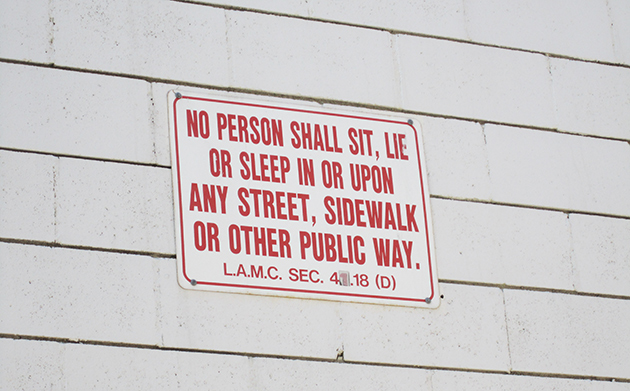
On the other hand, what people are really trying to do is avoid the police. And that means that support and community and providing for each other can only go so far. Fearing harmful and potentially deadly police encounters, the vendors acted like surrogate cops. Although they sometimes protected certain of their peers from detrimental police encounters, they mercilessly punished others for attracting too much law enforcement attention. Knowing that the cops tend to target homeless people, addicts, and idle groups of “suspicious looking” pedestrians, the vendors took it upon themselves to forcibly purge these people from the vicinity. Their attempts to cool off the block ended up exposing fellow Skid Row denizens to even more miseries. As if zero-tolerance policing hadn’t done enough harm, the vendors had introduced their own brand of anxiety, fear, violence, and marginalization.
Leticia spent very little time on the corner. When she did stop by to bring Jackson lunch or money or to pass along a message, she seldom stayed longer than a brief conversation. But that changed. Jackson had been arrested a few months back while trying to steal textbooks from the bookstore at a nearby community college. For this crime, he served just over 90 days in county jail, where he suffered debilitating withdrawal symptoms. But by the end of his sentence he had sobered up.
When he got out, Jackson was determined to get his and Leticia’s lives back on track. Without the income provided by his hustles, Leticia was unable to pay the rent on their SRO room and building management had forcibly removed her from the unit and marked their rental history with the note “abandonment”—a stain that would make it even harder for them to secure housing in the future. With nowhere to turn, Leticia followed her addiction out into Skid Row’s streets. At first, Jackson couldn’t find her. He spent a month scouring the neighborhood, spending a few hours a day scraping together cash on the corner. Finally, he heard from friends that Leticia had been spotted at the Union Rescue Mission. He was overjoyed to reunite with his partner of 17 years, and the two became inseparable.
His fellow vendors, however, were less than enthusiastic about the reunion. Their discontent came to a head one afternoon. Larry, Craig, and Terrance had all set up their shops a noticeable distance from Jackson’s. “What are you looking at?” Craig called out as Jackson glanced their way.
“Not much, apparently,” Jackson shot back, avoiding eye contact.
“What’s that, little man?” Terrance yelled. “Did you say something?”
Jackson turned his back on the two. “These assholes,” he said under his breath.
“What’s going on?” I whispered.
“They’re just being assholes,” Jackson replied, trying to appear unconcerned. “They’re pissed off that I got Leticia out here helping me out, trying to say she’s the reason we all got tickets a couple days back.”
Over Jackson’s shoulder, I saw Craig walking toward us, with Terrance in tow. “You talking more shit? You got something to say to my face?” Craig peered down at Jackson, fists clenched.
I tried my best to intervene. “It’s all good, man. Nobody’s talking shit. It’s all good.”
“No, man,” he scolded me. “It ain’t all good. This little nigga’s fucking it up for every one of us. He knows he can’t have her hanging around all damn day.” Craig turned back to address Jackson. “We told you that last time. Or don’t you remember?”
Jackson stood tall. “I can have anybody I…”
Craig’s fist caught Jackson mid-sentence, thudding into his stomach. Jackson buckled over. Leticia ran to his side. Craig took a step back and turned toward me, as though expecting me to attack. Instead, I froze, at a loss.
Craig continued to lecture, almost reluctantly, as if surprised at his own punch. “I done warned you. I’m done playing with y’all. You need to take this bitch and dip.”
“Who you calling bitch?” Leticia screamed, taking a step toward Craig, raising her fist.
Jackson grabbed her other arm, pulling her back. “Naw, baby.”
Craig stood staring at us for a moment, then turned away. He and Terrance walked back to their shops. I reached down and began gathering Jackson’s inventory and loading it back into his duffel bag. Leticia helped me as Jackson propped himself against the fence, catching his breath. The three of us headed toward their friend’s SRO room, where the couple had been spending their nights, sleeping on the floor. This was a violation of the building’s rules, but Leticia had been barred from the mission for showing up high.
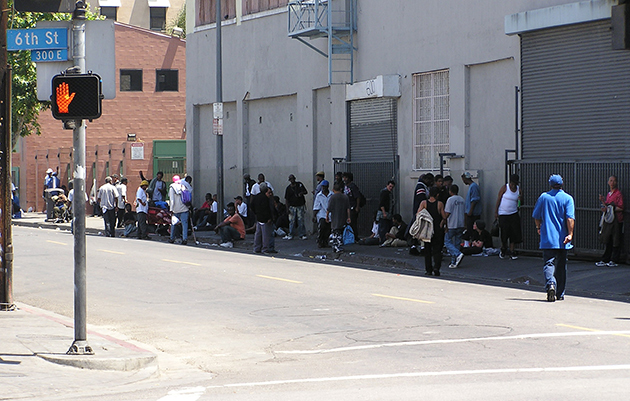
I pieced together the motive for Craig’s attack as Leticia ranted for two blocks. She flailed one arm in explanation, keeping the other arm tight around Jackson’s waist as she huddled close to his body. This was, apparently, precisely the kind of behavior that had been catching the officers’ attention. Over the course of the previous week, Leticia and Jackson had been detained twice while they stood on Fifth Street.
“We was just standing here minding our own business,” Leticia complained, “when two of them came up and asked me if I was ‘working.’ At first I didn’t know what they meant. I thought they was asking if I needed a job or something. But then I realized these assholes was asking if I was trickin’! I said, ‘This is my husband right here.’ But they didn’t even believe me. They made us take out our IDs and show them we had the same last name. Then they asked us if we were on probation or parole, if we had any warrants on us. Just for standing here talking. After all that, they still told me to take off.”
“Not before they wrote us all up,” Jackson added. “Craig too.” Jackson’s sobriety made him seem reserved next to Leticia’s constant fidgeting.
We arrived at the SRO building, where Leticia ran inside to use the bathroom and Jackson and I leaned against the wall. “Those guys really fucked me,” he said after a short lapse in the conversation. He gazed out at the street, deep in thought. “I mean, I know she makes it harder for me, and for them. I understand. But I don’t have a choice, man. That’s my wife.” His voice quieted. “Next week, I’m fucked.”
“Why? What’s up?” I asked. “It’s Mother’s Day,” he replied.
“Mother’s Day already happened.”?
“No. The other Mother’s Day. That’s what they call it when the checks come in. The GR [General Relief] checks. Her pick-up date’s on the fourth, but I can’t leave her alone at all that week. Last time she damn near smoked up her whole check before I could get her to give me her money. And she fought me on it. When I got out, she was using even worse. I can’t make her stop completely. She ain’t strong enough to go cold turkey like me. It kills me, man. That’s my wife. That’s the mother of my child.”
He sighed, and continued. “I go a make sure she don’t kill herself, or up and disappear or something. We’re broke, Forrest. How am I supposed to keep my wife alive and keep saving enough money to get a place? We can’t be in the mission no more!”
I offered what I assumed to be the most obvious solution. “Dude, why don’t you just move? Set up somewhere else and then you don’t have to worry about Craig or anybody.”
“Yeah, I’m gonna have to. That’s the only way I can have her out there with me. But that was the first place all my regular customers go when they get paid. Nobody wants to go nowhere else for movies ’cause they don’t wanna spend their money on a disc that don’t work. Ain’t no refunds and returns in this business.” Jackson sometimes proved to his customers that a DVD was good by previewing it on one of the other men’s portable DVD players—one of the resources they readily shared. “Customers don’t wanna take a risk on a movie that don’t work. That means I go a sell them for less. Probably half price! That three-dollar movie I got is gonna end up going for a buck, if I’m lucky.”

The two of us stood in silence. We both understood Jackson’s predicament. Returning to Fifth Street would require leaving Leticia unsupervised. Abandoning Fifth Street to support his wife through her recovery would immediately reduce the couple’s already meager income. This would mean they wouldn’t be able to move off the streets and into their own room for the foreseeable future. As research on homelessness consistently demonstrates, Jackson’s chances of keeping Leticia (and himself) away from crack and crack-addicted peers would be extremely low if the two couldn’t find housing.
Down on Skid Row, the intensification of policing does more than just crack down on minor neighborhood problems and disturbances. It alters the equation that determines how residents view each other—and whom they consider a problem or disturbance in the first place. When they act on these views, they sometimes end up hurting the most marginalized among them—people desperate for help. With hyper-policing, neighbors may help keep a watch on crime and bad behavior, do so to the detriment of the larger community. We get eyes on the street, but they’re not the kind of eyes we want.
A week after the altercation with Craig, I stood with Jackson and his wife on Seventh Street, on the opposite side of Skid Row. I watched as he sold one of his DVDs at half price, just as he had predicted. He turned to me, defeat in his eyes. “You wanna know what living in Skid Row’s really like?” he asked, referring back to our very first conversation more than a year earlier. “Trying to make a living down here, getting done the way Craig and those guys did me, you know what it’s like? It’s like hustling backward.”
